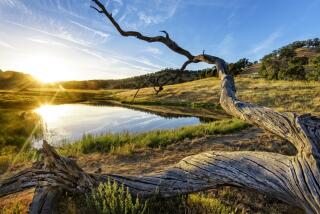Daffodil Hill, a once-hidden gem, has closed after crush of visitors
- Share via
A daffodil-covered landscape that had become an Instagrammer’s paradise no longer will be open to visitors after the family-owned property decided it couldn’t accommodate the hordes of tourists drawn to the flowery field in Northern California.
Daffodil Hill, a once-hidden gem in Sutter Creek, has ballooned into an overcrowded sightseeing destination, joining several other nature sanctuaries in California overrun by the masses. Unable to accommodate the uptick in popularity, the owners announced this week they have closed the attraction indefinitely.
The ranch property, whose original owner had planted a garden of flowers native to his Dutch homeland, was purchased by the McLaughlin family in 1847. When Lizzie Van Vorst McLaughlin bought the property with her husband, she tended to the daffodils for their way-station operation, which provided rooms and meals for travelers. When she died, her children planted the same flowers every year in her honor, and the tradition has carried on with each new generation. Over the last 80 years, the family has welcomed hundreds of thousands of visitors.
But its popularity became Daffodil Hill’s downfall.
“Sadly, it is this overwhelming popularity that has led us to our decision to close,” the family announced in a Facebook post Monday. “After the crush of visitors that descended upon our Hill this year, we came to realize that the limitation on the size of our parking areas and the inability of the local road infrastructure to handle the volume, created liability and safety concerns for everyone involved.”
Thousands descended on Daffodil Hill, home to peacocks and chickens and a horse, during opening weekend in March. Visitors either spent a two-hour wait for parking in a lot that was too small to accommodate the crowds or parked illegally on the street. The volume proved too much. After considering various remedies to the congestion — including shuttles and reservations for attendance — the family said the ranch’s narrow roads and infrastructure couldn’t handle the crush.
“Despite our best efforts, the volume of visitors was just too much for the roadways, the Hill itself, and there is simply not enough space for everyone to park,” the Facebook post said.
The last season lasted only six days because of heavy rains. But in that short span, Instagram was filled with photos that tagged Daffodil Hill, drawing even more visitors to the property in Sutter Creek, a city of less than 3,000 in Amador County.
After news of the closure broke, more than 1,000 comments piled in on Daffodil Hill’s Facebook page, many of which supported the decision:
“You have made a wise and safe decision, as social media has made this an overwhelming congested location with traffic.”
“Thank you for making Daffodil Hill a place where I could take my friends. Totally understand what you have to do.”
“I am glad I was able to visit quite a few times some 40 years ago before it became popular.”
“Sadly not surprised; your family faced a heartbreaking choice with few options.”
Still, the closure will affect more than photo-seekers.
“The impact of the closure will be very significant for Sutter Creek and surrounding towns,” said Lisa Klosowski, director of the Sutter Creek Visitor Center. “Each year, business owners look forward to the opening of Daffodil Hill because it signifies the start of our tourist season and gives us the financial boost that is needed after the quiet times of January and February.”
Klosowski, who made annual trips to Daffodil Hill with her mom, said the Amador Council of Tourism and other organizations are aiming to offset the closure with plans to plant daffodil bulbs throughout the county. The hope is that people will continue to make Sutter Creek and its surrounding restaurants and shops a springtime destination.
The family made one final request for those who have visited their daffodils:
“As we close this wonderful chapter in our family history, we ask that you honor our ancestors by continuing to appreciate Mother Nature in all her glory whenever and wherever you can.”
More to Read
Sign up for Essential California
The most important California stories and recommendations in your inbox every morning.
You may occasionally receive promotional content from the Los Angeles Times.














